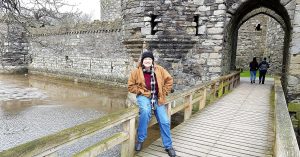
I wish I could say when I stood on the deck of the ferry in Dublin harbor on my way to Wales I bid a fond farewell to Ireland, but it was too early in the morning and I was too sleepy to wave good bye to anything or anybody. Josh and I wandered around until we found an almost empty lounge and stretched out for a nap.
Perhaps you might think that we were foolish to sleep away any moment on a trip to Europe, but you’ll soon find out your body doesn’t care where it is. When your body wants to crash, it will crash. Luckily we woke up just as the jagged mountains of Wales appeared on the horizon. We stumbled off the ferry and found our new tour bus and driver. The countryside architecture in Wales was somewhat similar to Ireland but not really. Our tour guide announced not to get too comfortable because we were about to tour the “greatest castle never built.” Okay, that didn’t make any sense so I thought I needed another quick nap.
Just then we found ourselves on a lovely tree-lined country road along a broad river with old brick houses built along its banks. Ahead of us was colorful village with a pier and Ferris wheel (It was closed for the season; after all, it was March. We were lucky the sun was out.) The bus stopped, and the tour guide said we had two hours to tour the castle and eat lunch before meeting back at this very spot.
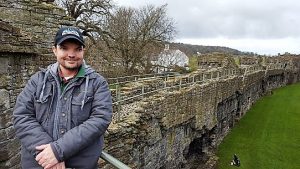
There it was before us—Beaumaris Castle on Anglesey Island. Beaumaris means beautiful swamps—sounds like a name we’d use for a bit of dry land in the middle of the Green Swamp of Florida. English King Edward I conquered Wales in the 13th century and started building this castle to make sure Wales stayed conquered. It was designed on the wall within a wall concept, meaning if your troops made it through the first wall you would now be caught in a small enclosed space and much easier to kill. I don’t think Josh and I made it entirely around the ramparts of the outer wall, but we could see how a small population could have lived quite comfortably and safely within its confines. In a small room off of the center courtyard we watch an informative movie on what was built and they didn’t get around to because Edward (known to his enemies as Longshanks) lost interest. He decided conquering Scotland would be more fun. For movie fans, this is the fiendish king in Braveheart who had William Wallace drawn and quartered.
Josh and I have always been fascinated by history so we found ourselves in a bind when we saw we only had a half hour or so for lunch. Luckily we wandered down a side street and found a fish and chips place next to the Ferris wheel. We knew the food had to be good because all the locals were crowded in. That also meant we had to wait. We decided we had to hone our time management skills. I don’t know why we worried. We still weren’t the last ones back on the bus. Remember, we were traveling with a group of teen-agers.
I sat by the window searching the countryside for Llanwelly village and Talbot castle. Fans of old horror movies know that’s the location of “The Wolf Man” with Lon Chaney Jr. “Even a man who is pure in heart and says his prayers at night may be a wolf when the wolf bane blooms and the autumn moon is bright.” Saying that to myself a couple of times put me back to sleep and the next thing I knew we were in England on our way to Birmingham.
There was nothing really exciting in Birmingham but a nice hotel with a nice dining room and a lot of nice rooms with beds. When you are as tired as I was that day, the only descriptive word you’ll be able to think of is nice. Which isn’t so bad after all.
Monthly Archives: May 2018
David, Wallis and the Mercenary Chapter Twenty-Nine
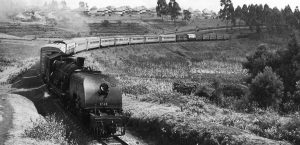
Previously in the novel: Novice mercenary Leon fails in kidnapping the Archbishop of Canterbury because of David, better known as Edward the Prince of Wales. Also in the world of espionage is socialite Wallis Spencer. Wallis, in quick succession, dumps first husband Winfield, kills Uncle Sol, has an affair with German Joachin Von Ribbentrop and marries Ernest.
Hitler wants Ribbentrop to steal the Crown Jewels.
David thought traveling was such a bore with his valet Tommy Lascelles hanging around like a snoopy younger brother—witnessing his social indiscretions and eagerly reporting back to Papa and Mama. Tommy believed in the old order of royalty, honorable without any hint of moral turpitude. He rarely smiled, obsessed with duty, stiff, and emotionless. Like a marble statue Tommy was unable to feel love, joy, anger or pain. An eternal life of nothing. It’s not like Tommy Lascelles had not experienced sexual pleasure—he had a wife and children. At some point, Tommy let down his proper British face to bask in wanton fleshly delights with his wife, both legally and morally his own.
Well, David told himself, Tommy’s private life was strictly his own and not open to criticism, even by the Prince of Wales. He had more a more pressing agenda—retrieving gems stolen from the Crown Jewels of England. David stopped before entering the dining car of the Tanganyika Express hurtling its way through the night to Dar Es Salaam during one November’s frequent short rainfalls. He regarded his reflection in the dark window pane. Every hair was in place. His tanned face was without flaw. He smiled. His teeth gleamed. Adjusting his shoulders, David made certain the center button in his hand-crafted dinner jacket was fastened. Last he made sure all the trouser buttons at his crotch were secure. His father often forgot to button after visiting the loo, creating an awkward situation at the palace.
He looked through the window into the dining car to spot the ambassador’s wife, Mrs. Edith Barnes—the lady who possessed a stash of gems from the crown jewels. The man who actually stole them from the Tower of London—her brother-in-law and assistant tower administrator—had been immediately apprehended. The thief wasted no time confessing Mrs. Barnes had seduced him into stealing the jewels. Now no one in the justice community cared about punishing wife of a British ambassador. All the British government wanted was the jewels back. They knew that Ambassador Barnes and his wife Edith took an ocean liner from Portsmouth to Leopoldville, rode a steamer up the Congo and then transferred on several trains to reach the capital of Tanganyika territory. The ambassador used most of his travel time in conference with African officials trying to iron out lingering details of land concessions made by Germany at the end of the Great War.
David noticed a gentleman had taken the seat opposite to Mrs. Barnes at her dining table. He sat with his back to David who felt comfortable making certain assumptions about the man. He was tall, and, from the way his jacket hung on his frame, he was athletic. His blond hair was closely cropped. And though he could not see the man’s face, David was sure he was handsome because of the glint in Mrs. Barnes’ eyes.
The prince made an unobtrusive entrance and slid into a chair at a table across the aisle from Mrs. Barnes. He had met her at several cocktail parties in the Mayfair district. Whether he had bedded her, he could not remember—probably did. She had not become close enough to be given the honor of using his family name of David instead of the royal Edward. Once her gaze drifted from the stranger’s eyes she would see him and immediately abandon her latest glittery toy. David slumped slightly in his chair, lit a cigarette and puffed away like he didn’t care. The man must have been more intriguing than David thought because he didn’t hear her shriek of recognition. Soon his attention was drawn to the fact a waiter had not appeared to offer him a glass of wine. He leaned a couple of inches toward Mrs. Barnes so he could hear the conversation. Her companion was speaking.
“My dear, never have I seen such beauty in one woman.”
He had a German accent but otherwise spoke clear and distinct English.
“Forgive me for my bluntness for I am a blunt man.” The German’s voice was deep and throaty.
David thought Mrs. Barnes was going to orgasm right there between the salad course and the entrée. There was no doubt this was the agent sent to retrieve the Crown Jewels from the ambassador’s wife. Was Hitler behind the plot? He shook his head. His imagination was running away with his good sense. But who else would want to steal the Crown Jewels? Who would be crazy enough to try? He tapped his long slender fingers on the table, trying to decide whether to hope if Mrs. Barnes would notice him on her own or should he introduce himself, before the German swept her off her feet and into her compartment.
Just as the stranger extended his large hand to touch hers, she glanced away and saw David. She sprang to her feet and gasped loud enough to be heard all the way in Rhodesia. “Oh my God! The Prince of Wales!” She attempted an elaborate curtsy which resulted in her right hand slapping the German’s face. “I had no idea your Highness was in Africa!”
The German melted into the background and eventually out the door. David could not help but notice however that he lingered outside, peering through the window.
With a weak smile, David said, “Have we met?”
“My dear Edward, we met at Upson Downs last season.”
“Oh yes. You were in the large blue hat.”
She giggled and gave him a playful slap on his shoulder with the back of her hand. “You naughty boy. You know we all were in blue for the races.”
“Hmm, your husband is in the diplomatic corps.” He crinkled his nose as in thought. “Barnes….that’s it. Mrs. Edith Barnes.”
“I would ask you to join me but I have a rather intense headache at the moment,” she whispered.
“My goodness.” An evil grin flitted across his thin lips. “You must remember how I can make headaches go away.” David glanced at the window in the door. The German was still there. “Perhaps your husband could join us.”
“Oh! He’s in conference two cars down. He’ll be involved with Tanganyikan officials until dawn.” She cocked her head. “I thought perhaps you were on the train to advise them in their deliberations.”
“No.” He puffed on his cigarette. “I’m on safari…hunting big game.”
“Fascinating. You must tell me all about it.”
“But I thought you had a headache.”
Her hand stroked his tanned cheek. “You’ve already made that go away.”
“In that case, please sit down and join me in a bottle of champagne.”
Mrs. Barnes sat and eventually succeeded in making David remember how they had made mad passionate love in a luxury hotel suite in the West End of London.
“Didn’t we see a play first?” David asked.
“Of course. It was written by Jerome Kern.”
He looked at the door and saw the German gone. He smiled, took her hand and kissed her fingers. “I think it’s time for an encore.”
She whispered her compartment number into his ear. “Meet me in fifteen minutes.”
When David glimpsed the door, this time he saw Tommy glaring at him. They returned to the prince’s compartment. After they entered and David latched the door, he sighed. “What’s happening now?”
“We’ve received a wire about your father.” Tommy was grim. “It’s not good.”
“Is he dead?” David tried not to sound too hopeful.
“No. But very close. He had another stoke. We must leave immediately for London.”
“Do you know the last thing he said to me?”
“No, sir. I do not.”
“He said, ‘You dress like a cad. You act like a cad. You are a cad. Go away.’”
Tommy looked down at a notepad. “A car will be waiting for us at the next stop. From there we will motor to the nearest airport where we will plane to Casablanca and embark on a naval ship to Portsmouth. You have less than thirty minutes to pack.”
“In thirty minutes I plan on bedding the wife of our ambassador.”
“Your father was right. You are a cad.”
David turned and, without a word, left the compartment and went directly to the next car where Mrs. Barnes was awaiting on him. As he passed between cars he noticed the rain had stopped. When David arrived Mrs. Barnes stood in her doorway talking to a black man dressed in a stylish white linen suit with a white straw hat in hand. Her left hand twirled her locks while she moistened her lips. As David walked up, she giggled like a shy school girl.
“My dear Mrs. Barnes,” David murmured, “I’m so glad you waited for me.”
“Hmm?” She glanced at him but returned her attention to the man in the white linen suit.
David glared at the man who stole the interest of his lady. He had the strange feeling he had seen this guy before; not only once, but many times even in that same suit. David pulled out his cigarette case, extracted one and smiled at the stranger. “Have you a light?”
“But of course.” He pulled out a silver lighter and lit the prince’s smoke.
“Have we met before?”
“Heavens no,” the stranger replied with a distinctive Bahamian accent. “You are a great gentleman, and I a mere colonial.”
“You look so familiar,” David pressed. “The man I met had one of those dreadful diseases. I hope it wasn’t you, and if it were, I hope it has cleared up.”
“Oh.” Mrs. Barnes’ eyes fluttered. She looked at both men, stepped inside her room and shut the door.
David smiled. “So sorry about that.”
“Think nothing of it.” The man bowed. “Such are the fortunes of romance.” He turned and sauntered away.
“Rapping on Mrs. Barnes’ door, David whispered, “Surely, my dear, you didn’t mean to turn me away as well.”
Ireland and England with Jerry and Josh Lost in Dublin
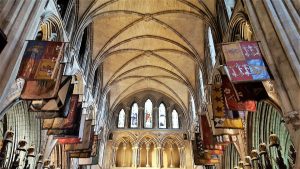
I always thought the best way to know a city is to get lost in it. Well, I must know Dublin like the back of my hand.
A nice lady led a tour bus excursion through Dublin for us. She pointed out the parliament building where people talk a lot but don’t get anything done. Sounds like back home. She took us through the large Dublin public park which had a huge obelisk, the equivalent of our White House and a giant cross where Pope John Paul II held mass several years ago. This piqued my imagination so Josh and I got out of the bus to walk up to the platform in front of a giant meadow. I think I could imagine a million people there. Pope Francis is scheduled for a visit next year so I suppose he will draw a million parishioners too. After that, the bus drove downtown where the Irish Rebellion began in the early 1900s at the post office. You can still see bullet holes in buildings and statues everywhere.
The bus then took us to St. Patrick’s Cathedral where all the famous authors are interred. The church had an astounding collection of wood carved saints along the walls. Flags hung everywhere. Famous stones were on the floor everywhere. We heard contradictory stories about who the woman buried next to Jonathan Swift was. One source said she was a close relative who was a companion but nothing more. Another source said she was a close relative who was his wife but not legally; no one ever said anything about it to him personally because, after all, he was Jonathan Swift.
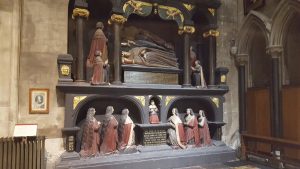 The bus next let us out at the juncture of five streets and told to be back in a couple of hours. Trinity College was nearby so our group went to the library where the Book of Kells was housed. The Book of Kells is the earliest known transcription of the four gospels of the Bible. We had to stand in line outside in the cold for a while before we were admitted. There were several joggers going by in their t shirts and shorts. Other students were sitting outside eating lunch. Others played table tennis on the green. That’s what I call being acclimated to the weather. I saw one young man have his a thick stack of papers blown from his hands across the campus. I hope that wasn’t his doctoral thesis. Once inside the library I was impressed by the high rows and rows of every book ever published in Ireland. The light streaming through the windows made them look golden. By the time I made my way to the room to the Book of Kells, I was informed access was closed because of a security system failure. I hadn’t been outside but a few minutes when word filtered out the glitch had been corrected and the room was now open. By this time I would have had to go to be back of the line again to enter the building. So I sat on the steps in the cold waiting for the rest of my group to come out, after they had observed the historic book. At least I didn’t have to witness another thesis blown to kingdom come.
The bus next let us out at the juncture of five streets and told to be back in a couple of hours. Trinity College was nearby so our group went to the library where the Book of Kells was housed. The Book of Kells is the earliest known transcription of the four gospels of the Bible. We had to stand in line outside in the cold for a while before we were admitted. There were several joggers going by in their t shirts and shorts. Other students were sitting outside eating lunch. Others played table tennis on the green. That’s what I call being acclimated to the weather. I saw one young man have his a thick stack of papers blown from his hands across the campus. I hope that wasn’t his doctoral thesis. Once inside the library I was impressed by the high rows and rows of every book ever published in Ireland. The light streaming through the windows made them look golden. By the time I made my way to the room to the Book of Kells, I was informed access was closed because of a security system failure. I hadn’t been outside but a few minutes when word filtered out the glitch had been corrected and the room was now open. By this time I would have had to go to be back of the line again to enter the building. So I sat on the steps in the cold waiting for the rest of my group to come out, after they had observed the historic book. At least I didn’t have to witness another thesis blown to kingdom come.
We walked several blocks to the Natural History Museum. This place had the longest dugout canoe I have ever seen. I thought the ones in Cherokee, N.C., were long but this one had them beat. The museum also had the remains of a man mired in a bog for several centuries so he was very well preserved. I imagine that was what I looked like when I curled up in bed that night. I would definitely recommend this museum to anyone who only had a couple of days in Dublin and was interested in stuff bogged down in history. Next we went to the National Museum of Ireland. We had passed both of these places on the bus and I thought it was right next door. Next to the back book. On another street. This gallery is where we were all separated. Exhibits didn’t exactly flow smoothly from one to another. It was more like enter a long white hall and try to guess which door to take to the next collection. All the art was breathtaking, but it wasn’t easy to get to.
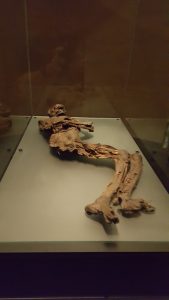
Our group then split up for some shopping. Josh and I were told about one place that was like an American convenience store but with healthier snacks. We walked back to the juncture of the five streets and looked up each one but couldn’t find it. After we placed a call to my teacher friend she directed us right to it. We had passed it several times. Josh and I felt sure we could make it back to the meeting point at the five streets. Josh found them. I walked right on past. I thought we were meeting another of the five corners. When I finally met up with everyone I spied an authentic old Irish drunk staggering by. To end the day we hiked to a restaurant for dinner. As we waited outside, I looked behind me I saw an old Irish woman with her three-wheeled walker wordlessly bumping into everyone’s legs to get through. The intimidating look on her face told us to gang way.
I wonder if she were married to the old drunk? Maybe she was the reason he drank too much.